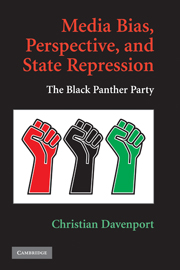Book contents
- Frontmatter
- Contents
- Figures and Tables
- Preface and Acknowledgments
- Media Bias, Perspective, and State Repression
- INTRODUCTION
- Part I Conceptualization
- 1 OBJECTIVITY AND SUBJECTIVITY IN EVENT CATALOGS
- 2 THE RASHOMON EFFECT, OBSERVATION, AND DATA GENERATION
- 3 UNDERSTANDING STATE REPRESSIVE BEHAVIOR
- Part II Cases
- Part III Conclusion
- Appendix: The Black Panther–U.S. Government Event Catalog
- Bibliography
- Index
1 - OBJECTIVITY AND SUBJECTIVITY IN EVENT CATALOGS
Published online by Cambridge University Press: 05 June 2012
- Frontmatter
- Contents
- Figures and Tables
- Preface and Acknowledgments
- Media Bias, Perspective, and State Repression
- INTRODUCTION
- Part I Conceptualization
- 1 OBJECTIVITY AND SUBJECTIVITY IN EVENT CATALOGS
- 2 THE RASHOMON EFFECT, OBSERVATION, AND DATA GENERATION
- 3 UNDERSTANDING STATE REPRESSIVE BEHAVIOR
- Part II Cases
- Part III Conclusion
- Appendix: The Black Panther–U.S. Government Event Catalog
- Bibliography
- Index
Summary
There is a great advantage in the way traditional content analysis has used newspapers in its studies of newspaper or communication content, propaganda, and public opinion…that what newspapers say is what you are really interested in. That is your reality. But if you are using newspapers as a source of socio-historical data, as a way to get to reality, as a mirror of that reality, then what the papers say is more crucial than we have been willing to face up to. Otherwise, we might as well face up to one thing. Let's change our titles to read: “Mobilization and Counter-Mobilization Processes: From the ‘Red Years’ (1919–20) to the ‘Black Years’ (1921–22) in Italy according to Il Lavoro,” “Democracy and Disorder according to Il Corriere della Sera.”
Roberto Franzosi From Words to Numbers: Narrative, Data and Social Science (2001) (emphasis in original)In Pitirim Sorokin's path-breaking Social and Cultural Dynamics: Fluctuation of Social Relationships, War and Revolution (1937), one will not find a single reference to the sources that were used to generate the data analyzed in the book, at least, not in the text itself. Those wanting information about how data were compiled for the twenty-five hundred years of interest to the study would have to consult the appendix (1937: 578–620). There, one would find a detailed listing of the historical monographs employed within the data-collection effort, as well as the relevant page numbers from which information was obtained.
- Type
- Chapter
- Information
- Media Bias, Perspective, and State RepressionThe Black Panther Party, pp. 25 - 51Publisher: Cambridge University PressPrint publication year: 2009



